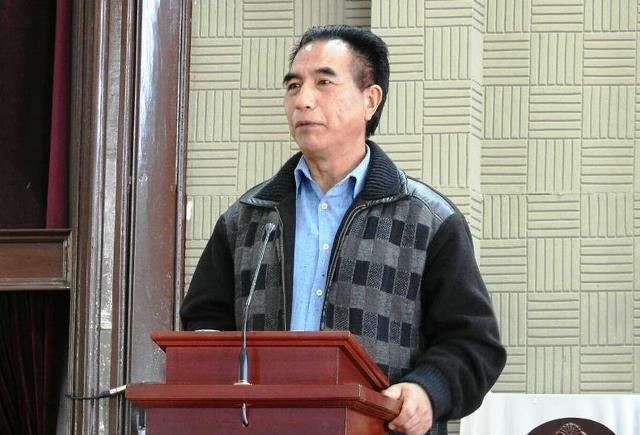
Methodical Mizoram Votes For A Change
What will immediately strike any visitor from a city in the plains to Aizawl, capital of the north-eastern state Mizoram is the disciplined way people live there. Congested Aizawl is with little green left, but life goes on in a quaint way. For instance, unlike drivers in Delhi or Kolkata their counterparts in Aizawl are not prone to take liberty with traffic rules or honk horn to the irritation of others. In the plains, election campaigns these days are marked by noisy processions, public order disrupting meetings and often pasting of revolting posters on the walls. The large cut-out of leaders all over the place once predominant in some southern states are now an all-India eyesore. Nothing like that in Mizoram.
In the kind of medley seen during the recent election campaign in Rajasthan, Madhya Pradesh, Chhattisgarh and Telangana, real issues often got blurred by announcement of promises destined to remain unfulfilled. The opposite was the case in Mizoram where Christians, according to the 2011 census, constitute 87.16 per cent of the population. Likely because of religiosity impacting their behaviourial pattern, the Mizos will unfailingly go by the norms laid down by the Church and civil society. With politicians in the plains prone to running wild in their campaign often describing opponent leaders in derogatory language, the north-eastern state presented an altogether different picture.
The three principal political outfits in the state, namely, ZPM (Zoram People’s Movement), now in power for the first time pulling off a silent revolution, MNF (Mizo National Front) that led a 20-year insurgency but finally signed the Mizoram Peace Accord in 1986 with the Union government and the Congress all agreed ahead of start of election campaign to abide by the code conduct while seeking favour of voters, authored by the Church-led Mizoram Public Forum (MPF).
Akin to what happens in more mature democracies, candidates from all parties will use MPF platforms to present their programmes and invite debates. Big election rallies and vulgar use of money power do not find favour with the code of conduct. Even door to door campaigns must not be intrusive. Election Commission in a rare instance conceding the Church request to postpone the vote counting day from a Sunday (3rd December) to the following day in order that religious activities were not disturbed is a testament of its influence.
Whatever the differences in behaviour of politicians and the public in Mizoram from what we have been experiencing in the plains, elections to the 40 member assembly in the tiny north-eastern state were keenly contested. Even while it was always the Congress or the MNF that would rule the state since its formation in 1987, at no point this time there was any doubt that the duopoly was destined to end and ZPM led by indefatigable former IPS officer Lalduhoma would come up trumps. Not only does Mizoram figure close to the top of state literacy table, but the voters, especially the young ones, are mindful of exercising their franchise. The recent elections saw nearly 90 per cent casting their votes. Mizoram is a vibrant democracy by any reckoning.
No doubt anti-incumbency had worked both against MNF and Congress. Local identity being a big issue in Mizoram, MNF lost traction with many by being a part of the BJP-led National Democratic Alliance. Data from Election Commission will show that there is no correlation here between the percentage of votes secured and seats won. ZPM got 27 seats with 37.86 per cent votes, MNF won 10 seats with 35.10 per cent vote and Congress secured only one seat with 20.82 per cent vote. Take BJP securing two seats with just 5.06 per cent vote against one last time.
Anti-incumbency and the concomitant administrative torpor definitely did work against the parties that between them always ruled the state. Poor governance and corruption linked to implementation of New Economic Development Policy and transfer of monetary benefits during the MNF rule convinced the Mizos that ZPM, full of new faces and drawn from different walks of life such as media and sports, has the potential to start a new chapter for Mizoram where poverty is rampant and unemployment high. ZPM promising a “new system” that will usher in “administrative reforms, land reforms and economic reforms” resonated with the voters.
ALSO READ: Double-Engine Manipur Goes Up In Flames
The state wanted a break with inactivity in management of state affairs and vibrancy in governance was what Lalduhoma promised. ZPM commitment to introduce minimum support prices for locally grown crops of ginger, turmeric, chilli and broomgrass and also their procurement went down well with rural families.
As he was sworn in as chief minister along with 11 ministerial colleagues, Lalduhoma’s three principal challenges will be to create jobs in industry and agriculture, introduce effective welfare schemes for women who stood by ZPM in assembly election in a big way and ensure that Chin refugees from Myanmar and Bangladesh and Kuki-Zomi refugees from Manipur are treated with compassion and respect. Incidentally, the Chin and Mizos are kindred tribes of the Kukis and they collectively are described as Zo people. Naturally, whether it is ZPM or MNF, the feelings are strong for refugee welfare. ZPM has, therefore, no compunction in saying that on the issue of taking care of refugees of identical ethnicity as Mizos, it stays on the same page as MNF.
Here, however, the rub is the Union government is disinclined to support the cause of refugees. Lalduhoma has occasions to register his regrets about the denial of Central assistance to look after the refugees. This, however, will not in any way dim his resolve to give shelter to the ones who fled from the tyranny of the Myanmar military regime. One of his top priorities on assuming the office of chief minister will be to prevail upon New Delhi to share the burden of refugee care. At this point, the state with parlous finances is hosting around 47,000 refugees.
Lalduhoma says: “The state’s financial situation is bad and the government has received a warning from the Reserve Bank on this. We will use the new financial year for consolidation.” The budget for the 2024-25 financial year bearing the stamp of ZPM policy will give the roadmap of attempts to be made at economic revival leading to creation of jobs and resurgence of rural economy, the chief minister has hinted. He wants his ministerial colleagues to embrace austerity. Only the future will tell how their behaviour will be once they taste power. The real challenge for Lalduhoma will be to enlist the support of the Centre without aligning with NDA. Mizo nationalism (one may call it sub-nationalism) is pretty strong. After all, one reason for MNF losing the turf to ZPM was its hitching to NDA.
For more details visit us: https://lokmarg.com/
Great and timely piece. For people in the plains, Mizoram is an unheralded state. It is, therefore, good that you have published this article highlighting the respects that make Mizoram stand out. Hopefully the new regime will be able to deliver good governance and redeem the pledges made in their election campaign.
Great article by Kunalda, enlightening those like me who havd never had any opportunity yo visit Mizoram,our neighbour.
The predominantly christian state of India is displaying s unique disciplined way of daily cores, unlike those in the plains. Kunal Bose has yet again brilliantly articulated the needs and requirements of Mizoram,having forced to shelter refugees from across its borders.
Senior journalist Suparna Pathak comments: “People hardly know North-East. The print media also never cared much. This piece by Kunal Bose plugs the gap to some extent. That a piece penned by Bose would go beyond just readable goes without saying.”
Commentator Suman Bhowmik says; “Lovely, Kunal da, specially in your bringing out the illegal influx of Chin-Kuki-Zo people will be fabulous if you can do a sequel highlighting how the church’s insistence on increasing its followers in this manner if playing havoc with regional economics and geopolitics.”
Prosenjit Dasgupta thinks: “The MPF example as a ‘public square’ is worthy of emulating elsewhere.”
Senior journalist Jayanta Roy Chowdhury says: “Excellent analysis.”



